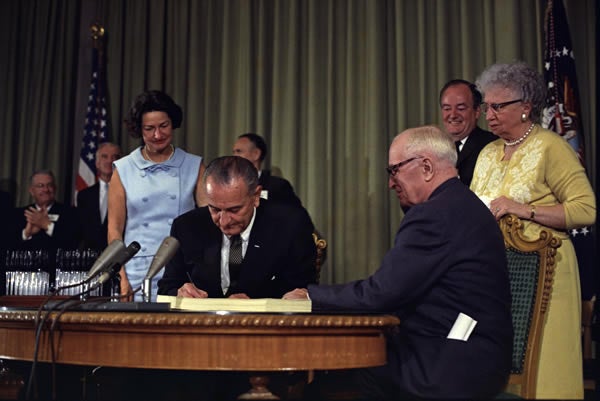It’s commencement time again: rows of folding chairs, the polyester cap and gown, a dozen of your closest relatives listening intently for your name, and of course the big name speaker. Georgetown’s School of Public Policy has Kathleen Sebelius, Columbia Law has umm, uhhh, Solicitor General Don Verilli, and Barnard College booked President Obama. These speeches are mostly opportunities to get a little good press coverage and encourage the next generation to join AmeriCorps or recycle.
Today, in 1964, though, one President’s commencement speech ushered in a new stage of liberalism. At the University of Michigan, President Lyndon Johnson boldly proposed the Great Society, the latest stage in the evolution of Woodrow Wilson’s Progressivism and Franklin Roosevelt’s Second Bill of Rights liberalism. Johnson combined the then-filibustered Civil Rights Act of 1964 and ambitious federal programs into a vision he dubbed the Great Society. The wildly utopian expectations (and experimental recklessness in social programs) brought modern liberalism into a crisis and dramatically expanded the administrative state, with all its cost and regulatory reach.
This Great Society, Johnson proclaims, is no “finished work” but “a challenge constantly renewed, beckoning us toward a destiny where the meaning of our lives matches the marvelous products of our labor.” As with John Dewey, Wilson, and Roosevelt, the ultimate aim is by design obscure, but it is a standard well beyond the material necessity and prosperity they presuppose.
Johnson proposes three sets of programs concerning the cities, the environment, and education. In each area we should seek both utility and beauty. Thus, Great Society urban policy should not only “rebuild the entire urban United States” in the next 40 years (by 2005) but promote “community” and combat “loneliness and boredom and indifference.” The environment should not only be unpolluted but allow men to “wonder at nature.” Education will not only bring children out of poverty; it will give them “hours of leisure.” Johnson is confident that a hyper-expanded government, reliant on Deweyan experimentation in government programs, can manage both political and spiritual transformation. Under the rubric of “creative federalism,” the Constitution’s true principle of federalism is overridden.
To develop such elevating programs, Johnson pledges to “assemble the best thought and the broadest knowledge from all over the world to find those answers for America.” With their aid, he asks students to fight four battles: for civil rights, against poverty, for enduring international peace, and, finally, for the Great Society, which seeks a “richer life of mind and spirit.” On all these fronts he retains all the utopianism of Progressivism and liberalism and reaches even further.
Johnson boasts that the Great Society marks a turning point in America’s history, which men will gratefully look back upon and say: “It was then, after a long and weary way, that man turned the exploits of his genius to the full enrichment of his life”—as though Jefferson, Lincoln, and Coolidge had no clue about leading a rich life.
Johnson called upon the graduating youth to join him in his cause but in principle capitulated to the most radical of them, as his Great Society articulated the vision of the Students for a Democratic Society (SDS). Founded two years before this address, the SDS protested the Vietnam War while closing down universities and demanding a total transformation of society along the lines envisioned by Dewey. This radical utopianism scarcely exceeded that of the man they would scream hatred at—Lyndon Johnson. Such are the dialogues of those who abandon the natural rights and constitutional government of the Founding.





























